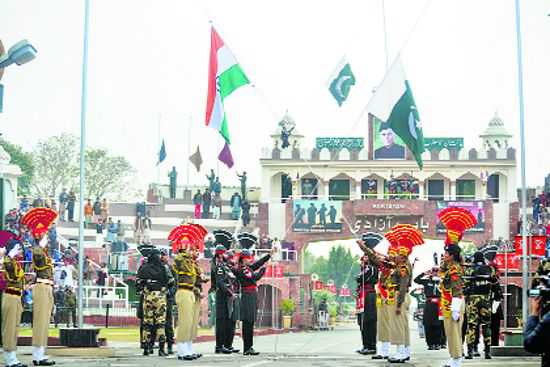Sharat Sabharwal
Former diplomat
ON my first posting to Pakistan in 1995, I was struck by their obsession with religion and India. All public and private activities were required to be informed by Islam. Their national discourse was consumed by India. Running India down was trendy. Every misfortune of the country was placed at India’s doorstep.
Sadly, more than 70 years after rejecting the ideology underlying Pakistan’s creation, we have come to mirror its obsessions. Pakistan admittedly thrusts itself periodically on our horizon with acts of terror. But it has now come to mean much more to us. It is to be the refuge for those among us we do not like. It is said to interfere in our elections, rejoices or is miffed at our election results and is even seen as the inspiration behind our opposition’s criticism of the government. Our TV anchors spend considerable lung power in trying to convince us of Pakistan’s perfidious behaviour (as if we need convincing!) and in shouting down equally offensive Pakistani panellists. Our political parties vie with each other to be seen as more muscular towards Pakistan. It is one thing for our political leaders to address the justified public anger at Pakistan-inspired violence with the assurance that such acts will not go unpunished and take discreet deterrent action, as required, as a self-assured country. It is quite another thing to stoke public anxieties by presenting the threat as bigger than what it is and describe tactical deterrent actions against it as strategic shifts to make political capital.
Pakistan’s obsession with India results partly from its insecurity vis-a-vis a much bigger neighbour, but largely from the defining of its identity as the other of India, its dominance by religious extremism and the institutional interest of its security establishment in maintaining an adversarial posture towards us. But what drives our obsession as the bigger country with a well-established identity spanning millennia?
Self-destructive stance
Pakistan lags behind us in all walks of life; its economy is one-eighth of ours. The gap continues to grow and will not be bridged unless Pakistan changes its self-destructive stance towards us. It is incapable of posing an existential threat to us by itself and is at the most a terror irritant that needs to be managed and contained. The only explanation of our Pakistan phobia is that the communal virus underlying its creation never left us and repeatedly rears its ugly head, its product fitting neatly into our politics in the name of religion.
Our laws forbid appeals for vote and promotion of hatred between different classes of citizens, inter alia, on the ground of religion. However, religion is continuously employed to influence voters’ choices and is omnipresent in our politics explicitly (party names linking them to a particular religion), by allusion (leaders’ ostentatious visits to places of worship before the elections, construction of a place of worship of a particular community, pitting historical figures of different religious communities against each other) or by insinuation (‘love jihad’, cow vigilantism, relative growth of population of various religious communities and seeking reform of abominable religious practices of others, while justifying one’s own). Serious mischief is caused when self-appointed defenders of interests of various religious communities, including those among politicians, generate a sense of insecurity on the ground of a threat to their religion. Seemingly at odds, they need each other to thrive and justify their hate politics.
Polarising society
Such insecurity, often based on utterly false or highly exaggerated grounds, breeds intolerance and has become a prime instrument to polarise society for political gains. How do we reconcile our laws with these practices? An answer may well lie buried in the fine print of our laws. However, simple logic, the interpretative tool of a common citizen, offers no answer. A genuinely secular election seems a lost cause, with few political parties capable of resisting the communal agenda.
History of bigotry
Our neighbouring country can become an existential threat to us only if the religious bigotry underlying its creation carries the day. Pakistan came into existence to set apart the Muslims of the subcontinent from other religious communities. It decided early on to be guided by the teachings and requirements of Islam, but failed to build a consensus on the branch or school of Islam that would govern it. Therefore, the policy of division and hatred next claimed the Ahmadiyyas as its victim by excommunicating them from the Islamic fold. It then accentuated the traditional Shia-Sunni schism and finally the rift between the Deobandis and Barelvis within the Sunni fold. Pakistan’s experience holds a stark lesson for us: intolerance and fanaticism, once let loose, do not confine themselves to ‘us’ vs ‘them’, but invariably tear apart the most cohesive looking ‘us’ groups, leaving violence and misery for one and all in their trail. We surely do not wish to go down that route.
If we put an end to our obsession with religion in public affairs, the spectre of Pakistan that seems to haunt us day in and day out will disappear automatically.
Views are personal
Unlock Exclusive Insights with The Tribune Premium
Take your experience further with Premium access.
Thought-provoking Opinions, Expert Analysis, In-depth Insights and other Member Only Benefits
Already a Member? Sign In Now










